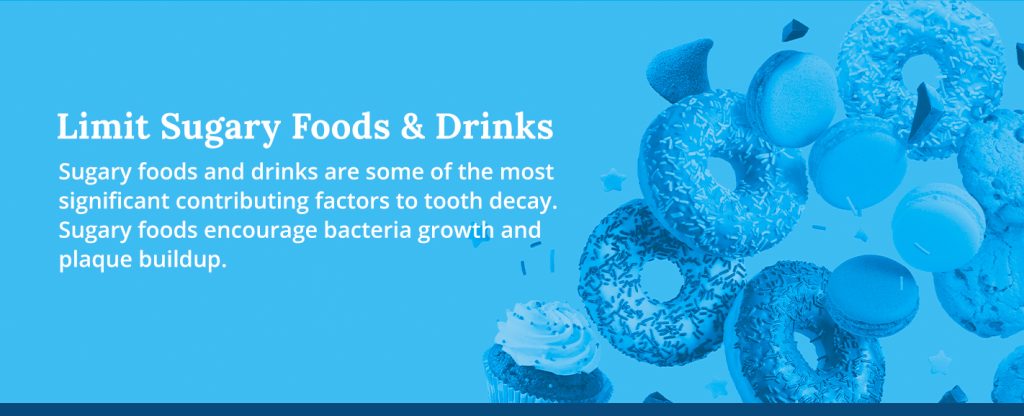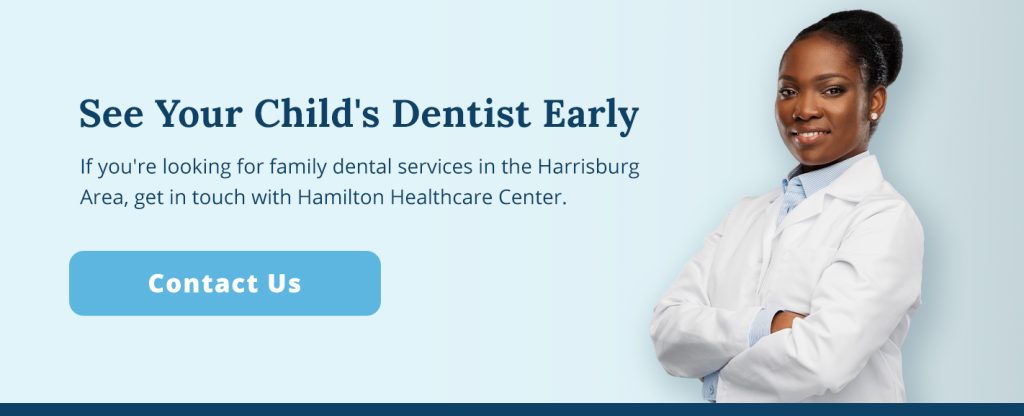Dental hygiene is important from a much earlier age than most people expect. Just because children lose their first set of teeth as part of their natural development doesn’t mean you don’t need to take care of them. Decaying baby teeth can cause long-lasting dental problems that can follow your child into adulthood.
Caring for your baby’s teeth and gums from the very beginning can significantly reduce their risks for serious dental issues later in life. Teaching your kids to care for their teeth at an early age can help build healthy habits that they’ll be thankful for when they’re older.
Dental Tips for Infants and Toddlers
Caring for your baby’s teeth and gums begins well before your child starts teething. Even before your child’s first teeth come in, you should clean their gums after each meal. Healthy gums are less sensitive and can help protect your baby’s first teeth from disease and decay.
There are multiple methods for cleaning your child’s gums. You can wipe them with a clean washcloth soaked in warm water or brush them with a damp piece of gauze wrapped around your finger. You can also purchase a special infant thimble designed for brushing gums. You can use these methods for cleaning your baby’s first teeth as well, or if you prefer, you can also use a soft-bristled toothbrush.
Learn more about the correct hygiene sequence.
Be Careful With Pacifiers and Thumb Sucking
Pacifiers and thumb sucking are common habits for infants and toddlers. Thumb sucking is a perfectly natural part of child development. However, prolonged use of pacifiers or thumb sucking can cause long-term problems such as crooked teeth. Of the two, pacifiers are preferable to thumb-sucking as it is an easier habit to break. For healthy toddler teeth, we recommend weaning your child off of their pacifier by age three.
Misuse of pacifiers can also contribute to tooth decay. To help care for your toddler’s teeth, avoid coating pacifiers with sugar or honey. In addition to directly contributing to tooth decay, coating pacifiers with sugar can make it harder to wean your toddler off the pacifier.
Be Careful With Bottles and Nighttime Feeding
It’s common for parents to let their child sleep with a bottle of milk, formula or juice. This practice, however, can cause serious harm to your child’s teeth, known as baby bottle tooth decay. To prevent this from happening, do not allow your child to sleep with a bottle or fill the bottle with water instead. Otherwise, the sugar in other drinks can adhere to your baby’s teeth while they sleep, causing accelerated tooth decay.
You’ll also want to move from bottles to sippy cups once your child is old enough. A good age for this is sometime between when your child can first sit up on their own and their first birthday. Drinking beverages like juice from a bottle is more damaging to a toddler’s teeth because the sugar is in contact with their teeth longer than it would be if they drank from a cup instead.
Tips to Prevent Cavities in Children
Cavities are an unfortunately common occurrence in children. Over 50% of children between ages six and eight have at least one cavity in their baby teeth, and 57% of adolescents have had a cavity in their permanent teeth. Fortunately, there are steps you can take to mitigate the risk of your child developing cavities.
Limit Sugary Foods and Drinks
Sugary foods and drinks are some of the most significant contributing factors to tooth decay. Sugary foods encourage bacteria growth and plaque buildup. In addition to the large amounts of sugar that provide food for bacteria, sugary snacks often contain acids that erode the surfaces of teeth. They also tend to be sticky and difficult to fully clean off your child’s teeth.
In addition to reducing the overall amount of sugary food and drinks your child consumes, limit the time and frequency of exposure. For example, only provide drinks like milk and juice at mealtimes and have water available for your child at all other times. Consider limiting snacks to set times and providing healthy low-sugar snacks like celery and baby carrots.

Start Brushing Early
One of the most important ways to care for baby and toddler teeth is regular cleaning of the teeth and gums. You should begin brushing your child’s teeth as soon as they have their first tooth. Brush your baby’s teeth twice a day.
As your child grows older, teach them to brush their own teeth. One of the best ways to teach them is to model for them. Be sure to supervise your child while brushing their teeth until they are around seven years old and consistently demonstrate proper teeth brushing behavior. Make sure your children are brushing their teeth for two minutes.
Also, watch to make sure your child is spitting out the toothpaste instead of swallowing it. Children should not rinse with water afterward for two reasons. Rinsing increases the likelihood that they will swallow the toothpaste. Water also washes away the fluoride in the toothpaste. Fluoride is important because it promotes healthy teeth for kids by strengthening tooth enamel.
Floss Daily
In addition to brushing their teeth, children should start flossing daily once they have teeth that are next to each other. This could happen as early as two years old and typically not later than six years of age. Flossing is vital because it prevents plaque and bacteria from building up between crevices in the teeth that brushing can’t reach.
Just like with tooth brushing, it’s important you show your child how to take of their teeth by flossing and supervisee them while they’re still learning. Enforcing daily flossing from an early age can help your kids build good habits for lifelong oral health.
See Your Child’s Dentist Early and Often
Early examination and preventative care can help keep your kid’s teeth healthy. Your child should visit the dentist for the first time within six months after getting their first tooth, or by their first birthday, whichever comes first. They should continue seeing their dentist every six months after the initial visit. Routine dentist visits promote good oral health.
In addition to providing professional teeth cleaning and preventative dental care, your family dentist will provide detailed information about caring for your child’s teeth and gums. Lastly, regular dental checkups increase the likelihood of diagnosing any dental health problems early before they develop into a more severe condition.
If you’re looking for family dental services in the Harrisburg Area, get in touch with Hamilton Healthcare Center. We provide comprehensive, affordable family dental services. Call us at 717-232-9971 to schedule your first appointment.



